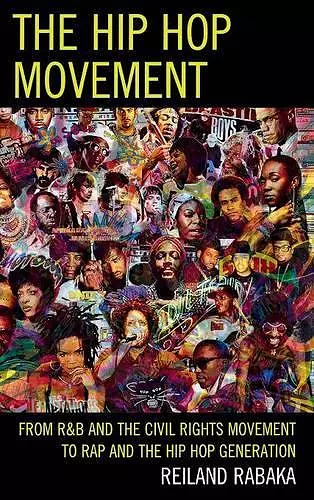The Hip Hop Movement
From R&B and the Civil Rights Movement to Rap and the Hip Hop Generation
Format:Hardback
Publisher:Lexington Books
Published:4th Apr '13
Currently unavailable, and unfortunately no date known when it will be back
This hardback is available in another edition too:
- Paperback£59.00(9780739182437)

The Hip Hop Movement offers a critical theory and alternative history of rap music and hip hop culture by examining their roots in the popular musics and popular cultures of the Civil Rights Movement and Black Power Movement. Connecting classic rhythm & blues and rock & roll to the Civil Rights Movement, and classic soul and funk to the Black Power Movement, The Hip Hop Movement explores what each of these musics and movements contributed to rap, neo-soul, hip hop culture, and the broader Hip Hop Movement. Ultimately, this book’s remixes (as opposed to chapters) reveal that black popular music and black popular culture have always been more than merely “popular music” and “popular culture” in the conventional sense and reflect a broader social, political, and cultural movement. With this in mind, sociologist and musicologist Reiland Rabaka critically reinterprets rap and neo-soul as popular expressions of the politics, social visions, and cultural values of a contemporary multi-issue movement: the Hip Hop Movement. Rabaka argues that rap music, hip hop culture, and the Hip Hop Movement are as deserving of critical scholarly inquiry as previous black popular musics, such as the spirituals, blues, ragtime, jazz, rhythm & blues, rock & roll, soul, and funk, and previous black popular movements, such as the Black Women’s Club Movement, New Negro Movement, Harlem Renaissance, Civil Rights Movement, Black Power Movement, Black Arts Movement, and Black Women’s Liberation Movement. This volume, equal parts alternative history of hip hop and critical theory of hip hop, challenges those scholars, critics, and fans of hip hop who lopsidedly over-focus on commercial rap, pop rap, and gangsta rap while failing to acknowledge that there are more than three dozen genres of rap music and many other socially and politically progressive forms of hip hop culture beyond DJing, MCing, rapping, beat-making, break-dancing, and graffiti-writing.
Rabaka (Africana studies, Univ. of Colorado, Boulder) begins not only by arguing the existence of a hip-hop movement, but also by defining its parameters and identifying the hip-hop generation. He also examines hip-hop's links to other music genres (rhythm and blues, rock 'n' roll, soul, and funk), as well as to black political movements. The author provides a rich look at the evolutions of these music genres and then their impacts on hip-hop. Rabaka examines fusions and samplings in which hip-hop artists have, for example, produced rock 'n' roll tracks or infused funk into their sound. The book is somewhat awkward in places in its effort to survey important music genres between 1945 and 1980 and link them to hip-hop. The author only secondarily mentions the influences of African and Caribbean music on hip-hop. Given their importance to hip-hop's development, an explanation for their omission would have sufficed. Overall, the book provides a depth of information, recalling many artists and music from hip-hop's old school and golden age. Rabaka analyzes hip-hop's complexity and various dialogues over the direction and presence of the hip-hop movement. Summing Up: Recommended. All levels/libraries. * CHOICE *
Persuasively argued, carefully researched, The Hip Hop Movement places hip hop in the tradition of previous Black political moments. Reiland Rabaka presents a bold challenge to hip hop scholars, Black Studies practitioners, Civil Rights historians and youth politics pundits alike….One of the most important analyses of hip hop and hip hop scholarship to date, Reiland Rabaka’s The Hip Hop Movement is a major contribution to our understanding of post-civil rights era politics and movement building. -- Bakari Kitwana, author of Why White Kids Love Hip-Hop: Wankstas, Wiggers, Wannabes and the New Reality of Race in America
ISBN: 9780739181164
Dimensions: 235mm x 161mm x 32mm
Weight: 785g
430 pages